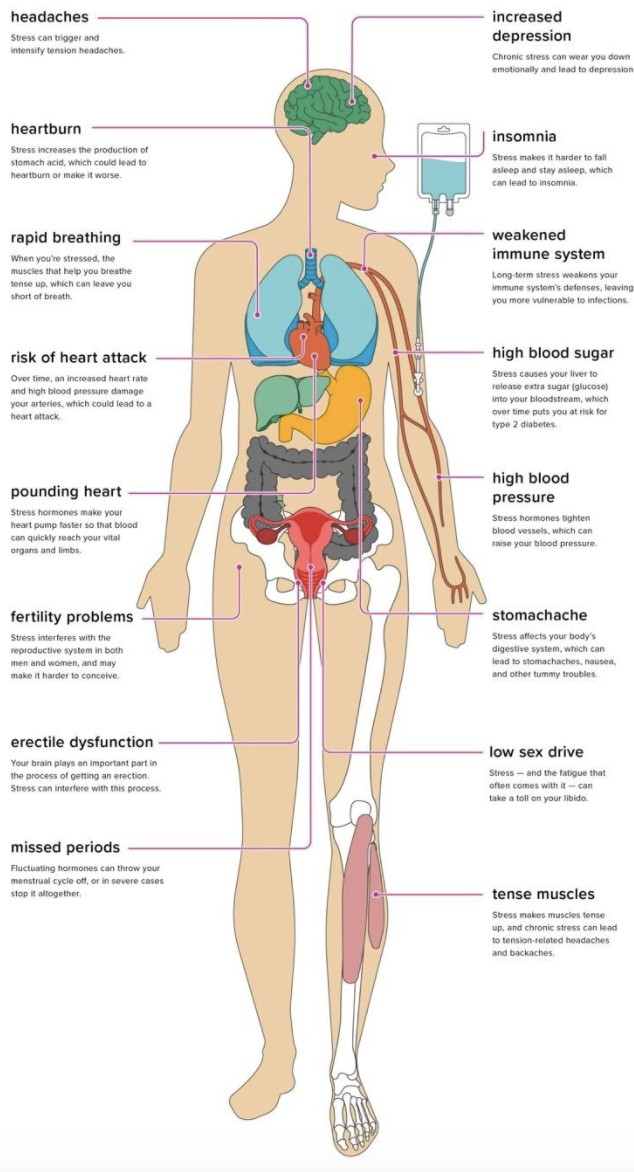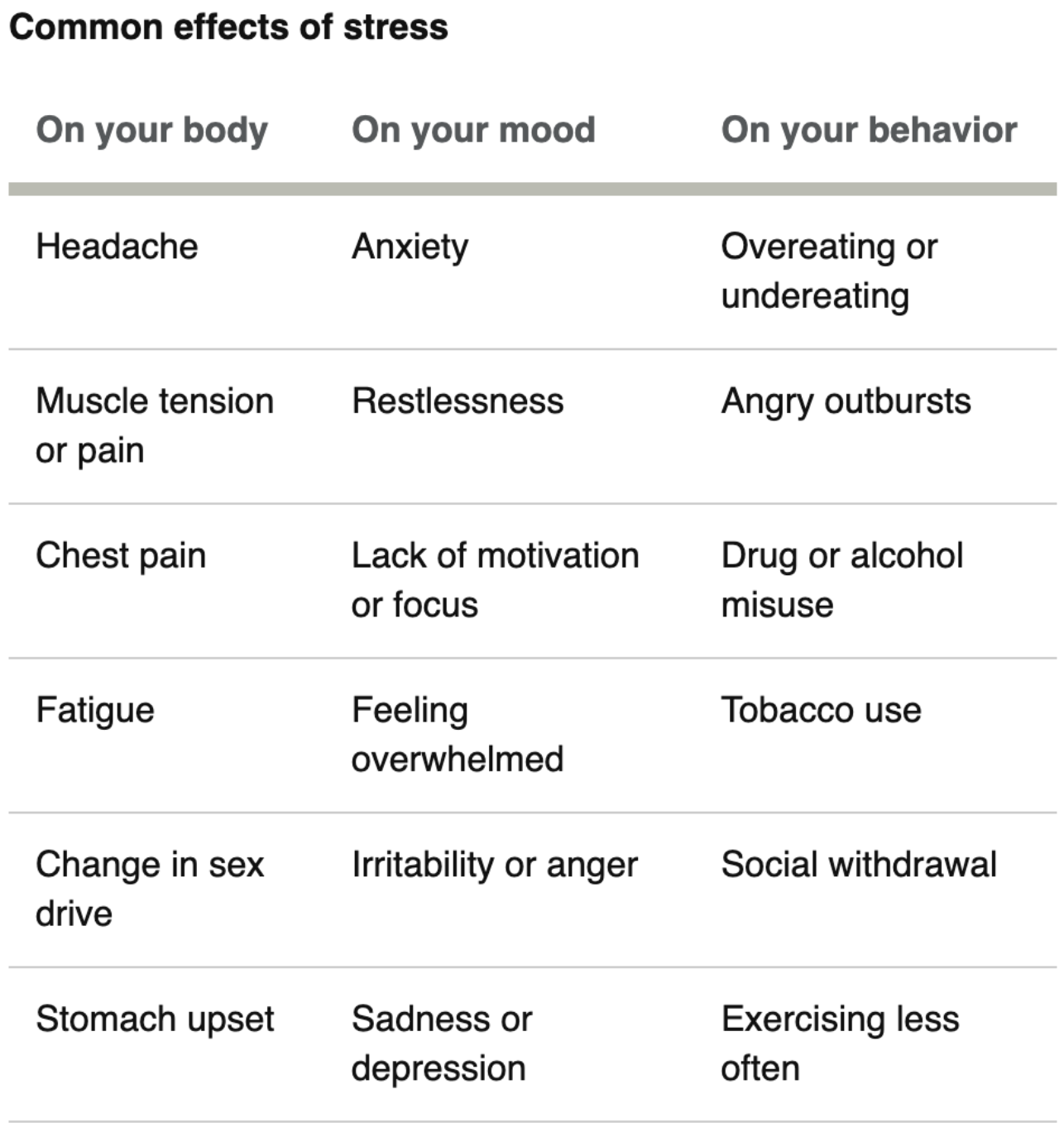
Welcome Spring! We sure have needed you. This winter was a rough one. Mother Nature wasn’t happy. The election was over, but then…was it really? The Insurrection on the Capital made us wonder. And the Pandemic raged on with devastating impact. The economy has been great for some, and the opposite for most. Racial strife has escalated. So, how have YOU been sleeping?
That’s the point of this month. We are in stressful times. We must focus on the stress that is all around us, how it is affecting us, and what we can do about it.
Stress is not all bad. Stress in some forms can save our lives. It alerts us of danger. In prehistoric times, it helped make us aware of predators looking for their next meal. Obviously, as noted in Healthline, for immediate, short-term situations like that, stress can be helpful to your health. It can help us cope with potentially serious situations. Our bodies respond to stress by releasing hormones like cortisol that increase our heart and breathing rates and ready our muscles to respond. But today’s stress is different. It’s always there. It doesn’t leave when the lion passes by. It’s become chronic, and the pervasiveness of stress today can have very harmful effects on our bodies and our minds. This is why we must find ways to Grind Less and Glide More. Or Glide More and Grind Less.
The words are interchangeable for a reason. In some aspects of life, you’ll find ways to Glide first then Grind less. You’ll find that if you just stop for a minute--you look up and find you can do some things in easier ways very quickly. Other times, you have to keep grinding away. And in doing so, you discover an innovation; or you bring someone in to help, so you Grind less before you Glide more.
Bottom line—we must reduce stress where we can. First, we have to recognize where it hits us. Here are some of the harmful effects of stress—do you have any of these symptoms?

Unchecked, these symptoms can lead to obesity, diabetes, and additions—which can lead to other more serious health issues. Stress can even affect your memory because you have trouble remembering the simplest things. You may think you’re getting Alzheimer’s or dementia—but it’s the brain fog of pandemic stress, according to neuroscientist Lisa Genova.
The Mayo Clinic dives deeper into the mood and behavior effects of stress:

Critically, while all women face stressors, Linda Goler Blount, President, and CEO of the Black Women’s Health Imperative (BWHI) says that “the inequities in the impact of stress on the health and well-being of Black women cannot be ignored. The lived experiences of Black women speak to the overwhelming stress in their lives.” This affects our life expectancy and higher rates of heart disease, breast cancer, maternal mortality, and more.
This doesn’t paint a pretty picture at all. We have to GLIDE MORE AND GRIND LESS!
To do so, first, I’d like us all to take a step back and remember the Serenity Prayer. Making any significant change in life starts with the right mindset.
God grant me the serenity
to accept the things I cannot change;
courage to change the things I can;
and wisdom to know the difference.
Reinhold Niebuhr (1892-1971)

Ten Simple Steps to Glide More and Grind Less
What can you control in your life right now? Here are ten simple suggestions that are proven to reduce the feelings of stress in your daily life. Don’t take them lightly. Try them and see how you feel:
- Getting regular physical activity. Consistency is key. It releases the good hormones that combat stress, and do it outside in nature if you can
- Practicing relaxation techniques, such as deep breathing, meditation, yoga, tai chi or massage
- Seek spirituality: prayer, reading, journaling, Bible study, chanting
- Just say NO. Set some boundaries to protect your time and your mind
- Take a vacay from social media and the news. It will provide clarity
- Keep a sense of humor; look for funny movies, videos to watch and share (Tik Tok cracks me up!!)
- Spending time with family and friends; make them a priority.
- Ask for help and support. Stop trying to do everything by yourself
- Setting aside time for hobbies, such as reading a book or listening to music
- Get your REST. It is imperative to slow down and rest your body, and your mind
Importantly, the Mayo Clinic advises that we find active ways to manage stress. Inactive ways to manage stress — such as watching television, surfing the internet or playing video games — may seem relaxing, but they may increase stress over the long term.
And of course, get plenty of sleep and eat a healthy, balanced diet. Avoid tobacco use, excess caffeine and alcohol, and the use of illegal substances.
When to Ask for Help
If you’ve tried steps to control your stress but your symptoms continue, always see your doctor. Your healthcare provider may want to check for other potential causes. And therapy or counseling can be another path to try to understand your stressors and learn new coping skills.
But get emergency help immediately if you have chest pain, especially if you also have shortness of breath, jaw or back pain, pain radiating into your shoulder and arm, sweating, dizziness, or nausea. These may be warning signs of a heart attack and not simply stress symptoms!
Last but not least, if the issues in our society are causing you stress, DO SOMETHING!! I like this take on the Serenity Prayer from a famous activist:
“I am no longer accepting the things I cannot change. I am changing the things I cannot accept.”
Angela Y. Davis
Doing NOTHING can also be stressful. Do what works for you—but pace yourself so you can Grind Less and Glide More as you do it! Life is too precious too stress yourself to death.
Hugs,
Amy









